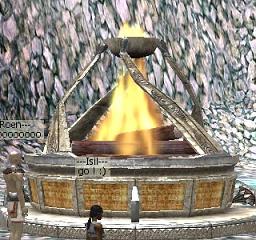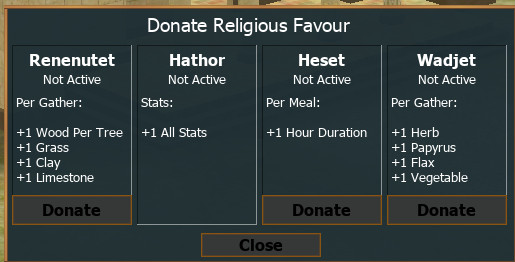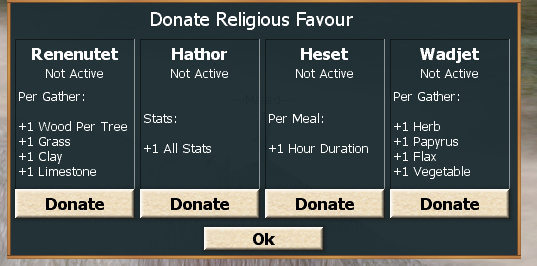Vigils
| (The Test of the) Vigil |
|---|
| (Test - Worship) |
| Demonstration Cost |
|
1 male sheep |
Conduct a Vigil at a Sacrificial Bonfire. Visions will come to those around the bonfire, illuminating the required offerings. Scoring is based on the length of the Vigil, and your participation.
Description
Conduct a Vigil using a Sacrificial Bonfire built near an Altar. Visions will come to the participants describing required sacrifices. The visions will come faster as the Vigil increases in length. Scores are based on the number of sacrifices made, and of the length of the Vigil itself.
Tasks
Team up with others to build the bonfire itself, and get two Talent Points after you have made your first Sacrifice.
- Locate a Common Altar
- Build a Sacrificial Bonfire (optional) -- grants 1 talent point
- Make a Sacrifice -- grants 2 talent points (but only 1 if you got 1 tp for making a bonfire)
- Spend accumulated Religious Favor at any University of Worship -- grants 1 tp
Additional Information
Historically Test of the Vigil was the first test in the discipline of Worship. As of T9, it is no longer a Test, but a way to generate benefit for all of Egypt via Religious Favour.
Conduct a Vigil at a Sacrificial Bonfire. Visions will come to those around the bonfire, illuminating the required offerings. Scoring is based on the length of the Vigil, and your participation.
The vigil starts off extremely slowly and only calls for a sacrifice every 15 teppy minutes. You can use the Stoke the Fire option to speed it up. Two stokes resulted in 1 sac call/minute. It seems you need an Iron Poker and Pyro 2 to stoke. It did not seem to slow down and additional stokes did not speed it up from there.
When you build a bonfire it gives you a popup saying the first sac must be made in 5 minutes. This is a lie, you have 2 hours like normal.
Scoring
When a Vigil completes, the points for it are distributed as follows: Each player gets points equal to the number of their own sacrifices multiplied by the number of sacrifices made by other people at this Vigil. So if somebody did a Vigil all on their own, they would receive 0 points for it.
An example with 20 total sacrifices with 3 participants, if A, B and C made sacrifices.. A=10, B=8, C=2.. points would be A=100, B=96, C=36.
Points accumulate over time, so if you participate in several Vigils, the points for each are added to your score.
These points can then be spent at any University of Worship for temporary, Egypt-wide buffs.
Guilds
Guilds that help organise vigils:
Passing the Test
Complete the task (with or without the optional building a bonfire) to pass the test.
What is a Vigil, really?
A Vigil is, in essence, a large scavenger hunt. Clicking on the sacrificial bonfire gives you a list of items you must scavenge and the time limit for each item. The Vigil will continue until the participants fail to turn in an item in time. Vigils look complicated, but are great fun, especially as the hour grows late and people desperately struggle to find rare items to continue their Vigil. Vigil participants have been known to disassemble and salvage valuable buildings to keep it running long after they have achieved a passing score.
- Talent Point seekers: All you have to do is show up at the vigil and make one sac and then spend at least 1 point at a University of Worship. Just go to the vigil, take papy, slate, or anything else on this list: http://wiki.atitd.net/tale3/VigilSupplies in any reasonable quantity you can spare, and ask for a turn.
- If you want to do a Vigil in earnest - you NEED to do the following:
- Have a processing compound VERY close to the Vigil site. By, "processing," I mean, all of the buildings that turn one basic resource into another - Hackling Rakes, Distaffs, Rock Saws, and so on.
- Have large quantities of raw materials (such as cuttable stone, papyrus, flax, and so on) on-hand before you even start, so that you can either sacrifice the raws, or process and sacrifice the advanced materials, depending on what the Vigil calls for.
- Have one person dedicated to being the Caller, and announcing Sacrifices as they show up (and assigning them, if you're doing a firm turn-based system). Feel free to trade out callers as the Vigil goes on, but make sure you transition smoothly.
- Keep a log of what has been called, what has been sacrificed, and what's still open. While you can check the Vigil fire any time to see what Sacrifices are open, as the Vigil wears on, the list can become VERY long (up to 120 items, theoretically). This log will help future Vigils prepare more carefully.
- Keep an emergency stash of materials, in case someone can't make their sacrifice, so you can toss things in when an open Sacrifice gets down to the 5-minute mark.
- Note: it will ask for your seeds. For example, a vigil in T9 has asked for one watermelon seed, any kind.
How to Prepare for a Vigil
One suggested method of preparation is to gather the following...
- Five or six chests on-site
- Facilities for flax, boards, and bricks on-site
- Seeds of every type, jugs, and water on-site
- An ample supply of medium and small gems of each type (5-10 each), as well as knowledge of nearby public mines
- An ample supply of the rarer metal ores. (20-30 each), as well as knowledge of nearby public mines
- An ample supply of Papyrus (~1000), and an established method for getting more
- Baskets
- An ample supply of each type of fish (~500 for common types, ~60 for rare types), and knowledge of nearby bands?
- Two or three administrators or 'callers' who are committed to staying in shifts until the thing ends
- An established, understood, and agreed-upon system for accepting new participants, and putting them in order
- A nearby compound with all advanced facilities (saws, rakes, etc.) kept current, to which you have access
- Access to cuttable gemstones, as well as a variety of specialty cuts
- Mandibular glue
- Wines of varying sugar content, age, and percentage of alcohol
- The best shovels and hatchets you can find
- Unless your participants are already in the same guild, strongly consider making (or coopting) a guild just for vigil communications. Becoming a team, even just for the vigil, is a BIG boost to both productivity and morale (not to mention being able to coordinate who sacrifices next).
All of the above amounts are very speculative, based on how long you intend to keep the fire going. Lots of everything is a very valid strategy.
A solid recommendation would be to review the Vigil preparation lists provided by prominent Worship-themed guilds.
What to do
- Build your chests, stash your goods. Make everything viewable to the public and stashable by the public.
- The admins should be in the same guild if possible. If so guild the chests. If not, understand clearly who the "lead" admin is at any given time. That person will stay at the fire, call out sacs, and hand out supplies to the person whose turn it is. When the lead changes due to fatigue or injury ;), the lead gives all the chests to the new lead.
- When a new participant arrives, there are a number of ways of engaging them. An up-front donation works, as does delaying their spot in line for one round, to see how they work. Unfortunately once your fire is public it is not really possible to enforce anything. People can sacrifice out of turn if they want to, and it is undetectable. For this reason it is best not to go -too- public with your vigil. I trusted pretty much everyone in Egypt until my most recent Vigil. In my experience, ten smart people, admins included in that number, can keep a Vigil going almost to 200. If the need is dire, tell everyone to move back from the fire unless making a sacrifice. This offers some hope of at least shaming/outing a lurking sac-stealer
- Basically everyone who is in line should be working on someone's donation at all times. If there is a complete lull, Papyrus, flaxing, fishing, and digging are a never-ending source of amusement, as well as future relief.
- As Bortoas points out, it starts slow. Only the admins will be needed for perhaps the first 3–5 hours. Do not burn travel time during this period, and do not spend your stores. It will really peak after about 12, so the best time to start a vigil is in the middle of the night.
Additional Input - Myremi
- I had 1 caller, 2 people to ferry stuff over, 1 person recording actual sacs on wiki (he tracks this according to what the caller says). Towards the end, the caller updated the wiki as well but to ferry the stuff, best to assign 2 people to do the job. Always have backup for each duty in case things go wrong.
- Caller announces the person to do the sac AND next person in the queue.
- Chests were placed quite a bit back from the altar so that traffic (refilling chests/removing stuff) is easier.
- If there are 11 people present at start of vigil, can start digging for stones, even without food. Need a lot of cuttable stones.
- Make sure everyone understands the system in place and get a few people to act as backups in case leader(s) disconnect from system.
- May be a good idea to have some experienced folks nearby in case you need help.
- Be flexible in case you have to make changes to the system.
Public Vigils
Not all vigils are as Regimented as above. Many vigils instead use the regional chat channel where the vigil is being held. A caller will announce the items to be sacrificed, and an individual can claim those items, as follows:
- A caller announces an item, such as "283 rotten flax", usually while announcing a category (i.e. "The following items in 1 hour...")
- Player then types into whatever channel the Vigil is taking part in: "Claim rotten flax"
- Player is then responsible for ensuring those items are sacrificed before the timer runs out
Notes
A sacrifice will be listed as (in order of time):
- Longer than One Hour...
- Within One Hour...
- Within Twenty Minutes...
- Within Five Minutes...
- Within ONE MINUTE...
The first sacrifice of the vigil can now be made for up to 2 hours. If you fail to make a sacrifice after its 1 MINUTE warning, the bonfire will disappear and the Vigil will end. No mats are returned when the bonfire disappears.
To calculate your score, take the total number of sacrifices made, subtract the number of sacrifices you made yourself (both numbers are shown to you every time you make a sacrifice), then multiply the result by the number of sacrifices made yourself. So, if there are 200 sacrifices made in total, and you did 50 of them, your score is (200 - 50) * 50 which is 7500. Or, in other words, your score is the number of sacrifices you made multiplied by the number of sacrifices everybody else made.
Known Sacrifice Materials
On Nov-2-2019 Malard commented in in-game chat that the game scans storage containers for a list of possible items. This was in response to folks wondering how we were supposed to sacrifice eclectic rare fish meat. He said someone must have it. Later he suggested he would review how those came up as those rare fish demands killed both vigils.
~262 sacs in ~7 hours, nearly all vegetables, killed by 3 instances of unreproducible, wild only eggplant seeds
- later small vigil with a more diverse set of demands
Religious Favour
Hathor appears to be disabled currently.
For T9, players can contribute Religious Favor at the University of Worship to gain Egyptwide bonuses. The boost reportedly lasts 10 seconds per point donated.
You can check your Favor under Stats->Player Information->Show My Religious Favour, which will tell you:
- Your total # of Sacrifices
- Your Religious Favour Score
- A reminder that you can spend them at UWor.
- A reminder Vigils in progress do not generate Favour until they complete.
It seems that the boost time is capped at three days
Related Pages


